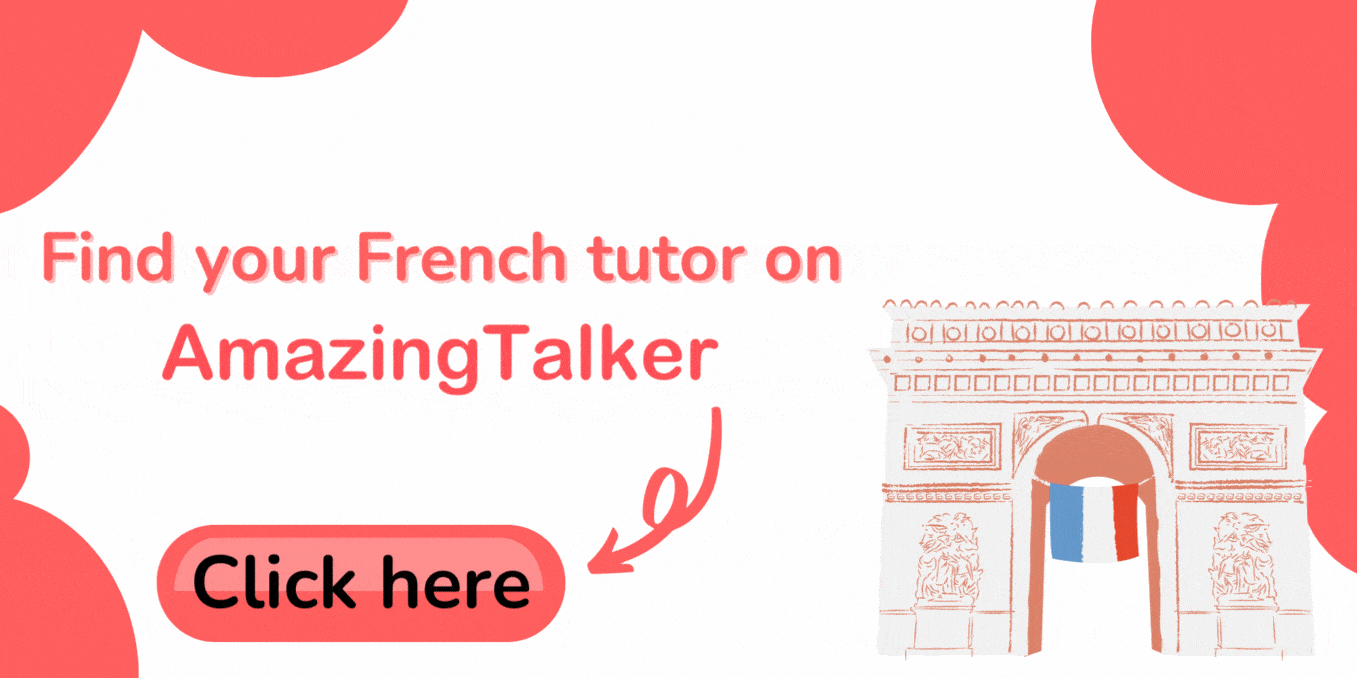Learning French sayings is very important since the easiest way to impress someone foreign, and make them laugh, is to learn how to pronounce their native language’s idioms and slang. This is a simple method for you to connect to their culture and show them you are trying your best. One of the most well-known French sayings is “Ooh la la”, people from all over the globe have heard this popular saying, but many don’t know what it actually means… you’ll learn about this later in the article though, don’t you stress!
If you are feeling a bit unsure of your capabilities then have a look at some basic tips to learn French and simply believe in yourself. Here are some French sayings, idioms, and more for you to discover and start using as soon as you land in France!
Famous French Sayings
You will be able to keep up with conversations by learning famous French idioms and sayings, but don’t use them all the time. The overuse of sayings might come across in the wrong way and you could possibly step on someone’s toes!

1. C’est simple comme bonjour!
Literal translation: It’s simple as hello!
English expression: Easy peasy.
How to use it:
- “Faire un paiement est simple comme bonjour”
- “Making a payment as easy as 1,2,3!”
Whenever something is straightforward, you may use this saying. It will make sense no matter the task you are describing!
2. La nuit porte conseil.
Literal translation: The night carries advice.
English expression: ”Sleep on it”.
How to use it:
- “Merci, Monsieur Poettering, la nuit porte conseil et vous en êtes arrivé à la bonne conclusion à propos de cette question.”
- “Thank you, Mr Poettering, for sleeping on the issue and coming to the right conclusion.”
This saying suggests that you should rest when you have an important decision to make because things will be more clear in the morning.
3. Petit à petit, l’oiseau fait son nid.
Literal translation: Little by little, the bird builds its nest.
English expression: Slow and steady wins the race / Every little bit helps / Rome wasn’t built in a day.
How to use it:
- “Apprendre une nouvelle langue est un défi, mais n’abandonnez pas ! Petit à petit, l’oiseau fait son nid.”
- “Learning a new language is challenging but don’t give up! Little by little, the bird makes its nest.”
Every goal, or situation, will have its hard times, but perseverance and determination will outweigh anything that stands in your way. This phrase reminds you to keep pushing forward, little by little.
4. Ce n’est pas la mer à boire.
Literal translation: “it’s not the sea to drink”
What it means: It’s not a big deal / It’s not that difficult / It’s not that hard/ It’s not the end of the world.
How to use it:
- “Ce n’est pas la mer à boire pour se préparer le dîner dans la semaine”
- “It’s not that difficult to cook dinner for yourself in the week”
To have to drink the whole sea is impossible, and that is why the opposite is a French saying. This is one of the oldest French sayings around and is said to have come from the mind of Jean de la Fontaine.
5. Après la pluie, le beau temps.
Literal translation: “After the rain, good weather.”
Actual meaning: This is a way of telling someone “don’t lose hope”.
How to use it:
- “Je sais que ce mois a été difficile pour vous à cause du travail et du décès de votre mère, mais restez positif. Après la pluie le beau temps.”
- “I know this month has been tough for you because of work and your mother passing, but stay positive. After rain the good weather.”
The sunshine, smell of the ground, and sound of birds chirping after rain are some of the most calming things. This phrase states that a storm cannot last forever, and that good things are on the way.
Funny French Sayings
6. Les chiens ne font pas des chats.
Literal translation: “Dogs don’t make cats.”
English expression: “The apple doesn’t fall far from the tree”
How to use it:
- “Votre fils est tellement doué au piano et à la guitare. Les chiens ne font pas les chats, tu as toujours été un si grand musicien.”
- “Your son is so talented with the piano and the guitar. Dogs don’t make cats, you have always been such a great musician.”
Whether we like it or not, we inherit traits and hobbies from our parents. This saying is rather brilliant with the way it’s been put together… Dogs indeed do not make cats! They are a completely different species.
7. “Ah, la vache!”
Literal translation: “Oh my cow”
English expression: “Oh my word” / “Holy cow”
How to use it:
- “Ah, la vache! Je viens d’apprendre que Sarah a eu un accident de voiture la nuit dernière et qu’elle a été emmenée à l’hôpital!”
- “Oh my God! I just heard that Sarah was in a car crash last night and she was taken to the hospital!”
This informal saying can be used for a negative or positive situation, and very seldomly for a neutral situation. It is mostly expressed when someone is extremely surprised, or if they are admiring something or someone. Sometimes you might say “ah, la vache” when you realize you’ve been confusing Tuesday with Wednesday because both days of the week in French start with the letter “m” .
8. “Faire l’andouille”
Literal Translation: “To make the sausage”
English expression: “Play the giddy goat”
How to use it:
- “Arrête de faire l’andouille. nous devons prendre ce projet au sérieux ou nous échouerons tous les deux à notre cours d’histoire!”
- “Stop making the sausage. We have to take this project seriously or we’ll both fail our history class!”
This ridiculous idiom means to play the fool and mess around. It is commonly used by French parents who are exhausted and tell their children to stop acting like an idiot. Some people can never take life seriously and some people take life too seriously… so aim to find a healthy balance!
9. Tu me casses les pieds
Literal Translation: ”You are breaking my ears”
English expression: “You are winding me up”
How to use it:
- “C’est assez! Je ne peux plus être près de toi John… Tu me casses les pieds”
- “That’s enough! I cannot be around you anymore John… You are breaking my ears”
There are people in this world that will annoy you to such a heightened point, it almost feels like they are physically affecting you, like “breaking your ears”. This is an informal saying and shouldn’t be used too often, as some people may find it offensive.
10. Avoir le cul bordé de nouilles
Literal Translation: ”to have a bottom lined with noodles”
English expression: “land with one’s bum in the butter”
How to use it:
- “wow, tu as vraiment le cul bordé de nouilles ! Votre mari est si attentionné, extrêmement intelligent et c’est le meilleur des pères.”
- “wow, you really have your bum lined with noodles! Your husband is so caring, extremely smart, and is the best dad.”
This phrase is used to describe someone that is very lucky and blessed with many beautiful things. When we convert this phrase from French to English it has a slightly different translation, but we made it more PG-friendly, ha!
Common French Sayings
11. Battre le fer pendant qu’il est chaud.
Literal translation: “Strike the iron while it is hot.”
English expression: Same as above.
How to use it:
- “Pourquoi restes-tu ici à attendre quand tu pourrais avoir de nouveaux clients ? Battre le fer pendant qu’il est chaud.”
- “Why are you standing here waiting when you could have new customers? Strike the iron while it is hot.”
A blacksmith is someone who will strike hot iron in order to shape it. This saying means to take an opportunity when it arises and run with it! If you don’t, you could miss out.
12. Comme on fait son lit, on se couche.
Literal translation: “You’ve made your bed, now lie on it.”
English expression: “You reap what you sow”.
How to use it:
- “Tu veux de l’aide de ma part parce que tu t’es fait prendre en train de tricher à ton examen ? Désolé mon ami, comme on fait son lit, on se couche”
- “You want help from me because you got caught cheating on your test? Sorry my friend, as one makes one’s bed, one lies down”
Humans must face the consequences of every action they take, whether they are good or bad!
13. À bon chat, bon rat.
Literal translation: “To a good cat, a good rat.”
English expression: ”Tit for tat” / “To meet your match.”
How to use it:
- “Je n’aurais jamais pensé que tu rencontrerais quelqu’un d’aussi têtu que toi, mais je vois que j’avais tort ! À bon chat, bon rat.”
- “I never thought you’d meet someone as stubborn as you are, but I see I was wrong! You’ve met your match”
14. Mangez bien, riez souvent, aimez beaucoup.
Literal translation: “Eat well, laugh often, love a lot.”
English expression: “Live life to the fullest” or carpe diem (“seize the day”).
How to use it:
- “La vie est si éphémère… Mangez bien, riez souvent, aimez beaucoup.”
- “Life is so fleeting… Eat well, laugh often, love a lot.”
15. Impossible n’est pas français.
Literal translation: Impossible isn’t French.
English expression: There’s no such thing as “impossible.”
How to use it:
- “Le mot “can’t” n’est pas autorisé dans ma classe car Impossible n’est pas français.”
- “The word “can’t” is not allowed in my classroom because Impossible isn’t French.”
Every challenge in life is an opportunity to grow, nothing is impossible once you set your mind to it! There have been many great people to walk on this planet and prove this quote to be true.
16. Qui vivra verra.
Translation: Time will tell.
How to use it:
- “Je suis tellement inquiète pour ma fille et la direction qu’elle choisit pour sa vie, mais seul le temps nous dira ce que son avenir nous réserve.”
- “I am so worried about my daughter and the direction she chooses for her life, but only time will tell what her future holds.”
Jean de La Véprie is the mind behind this famous quote. Jean was a French writer and moralist, his work Les Caractères captured the social, psychological, and moral profile of France at the time. This saying is very commonly used in English as well.
17. Chacun voit midi à sa porte.
Literal translation: Everyone sees noon at their door
English expression: To each his own
How to use it:
- “Je suis très différent de ma famille… Je préfère vivre lentement et intentionnellement alors qu’ils veulent être occupés tout le temps. Chacun voit midi à sa porte.”
- “I am very different from my family… I prefer to live slowly and intentionally while they want to be busy all the time. To each his own”
Everyone in life has a different view because we were all raised differently and have had unique life experiences… although this does cause tension between people, it is actually one of the most beautiful things in life! If we were all the same then it would be ever so boring.
18. Mieux vaut prévenir que guérir.
Literal translation: Prevention is better than cure.
English expression: An ounce of prevention is worth a pound of cure.
How to use it:
- “C’est presque l’hiver, donc nous devrions commencer à prendre plus de vitamine C et à prendre soin de notre corps pour ne pas tomber malade ! Mieux vaut prévenir que guérir”
- “It is almost winter, therefore we should start taking more vitamin C and looking after our bodies so we don’t get sick! Prevention is better than cure”
Holistic living focuses on nurturing your body so that nothing major will go wrong, don’t you agree with this way of life? Preventing illness, accidents and stress make life a lot smoother, but we have to remember that we can only prevent so much… life happens when you least expect it!
Romantic French Sayings
19. Avoir un coup de foudre
Literal translation: a bolt of lightning
English expression: love at first sight
How to use it:
- “Je ne l’ai rencontrée que récemment mais j’ai immédiatement ressenti une connexion entre nous. Avoir un coup de foudre”
- “I only met her recently but I instantly felt a connection between us. It was love at first sight.”
A spark when you meet someone is usually spot on, whether things happen soon or in the future. Love and connection speak loudly and it is best to listen to what your heart tells you!
20. Être fleur bleue
Literal translation: Be a blue flower
English equivalent: She’s so mushy
How to use it:
- “Votre cadeau est si attentionné, vous êtes un tel Être fleur bleue”
- “Your gift is so thoughtful, you are such a blue flower being”
In terms of flowers, the color blue represents tenderness and love, therefore it makes sense that this phrase uses a blue flower to describe someone that is sentimental and caring. It is ironic that the origins of this phrase come from the German novel Henri d’Ofterdingen by Novalis, not France!
FAQs for French Sayings
The phrase “Ooh la la” is actually more of an interjection than an idiom, and it is used to convey surprise, distress, or disappointment. It can also be to indicate if someone is impressed, happy or sad. “Ooh la la” is a universal saying that is commonly used throughout France, despite any differences, and in western films.
“Bah” is another very common phrase used, it can mean everything as well as nothing. Fundamentally “bah” means “of course” or “duh”, it can also mean “oh goodness” when expressing shock. The meaning of the word is heavily dependent on your pronunciation and the context in which you use it.
You’re the French Sayings Master!
You have just learned 20 new French phrases and are on your way to speaking fluently! Have we made your journey how to learn French any easier? We certainly hope so! If you are a verbal learner who prefers to speak in order to learn, then find an online French tutor to have conversations with. AmazingTalker has a range of tutors for you, and you can learn almost any language… from French to Japanese, we have it all!

















